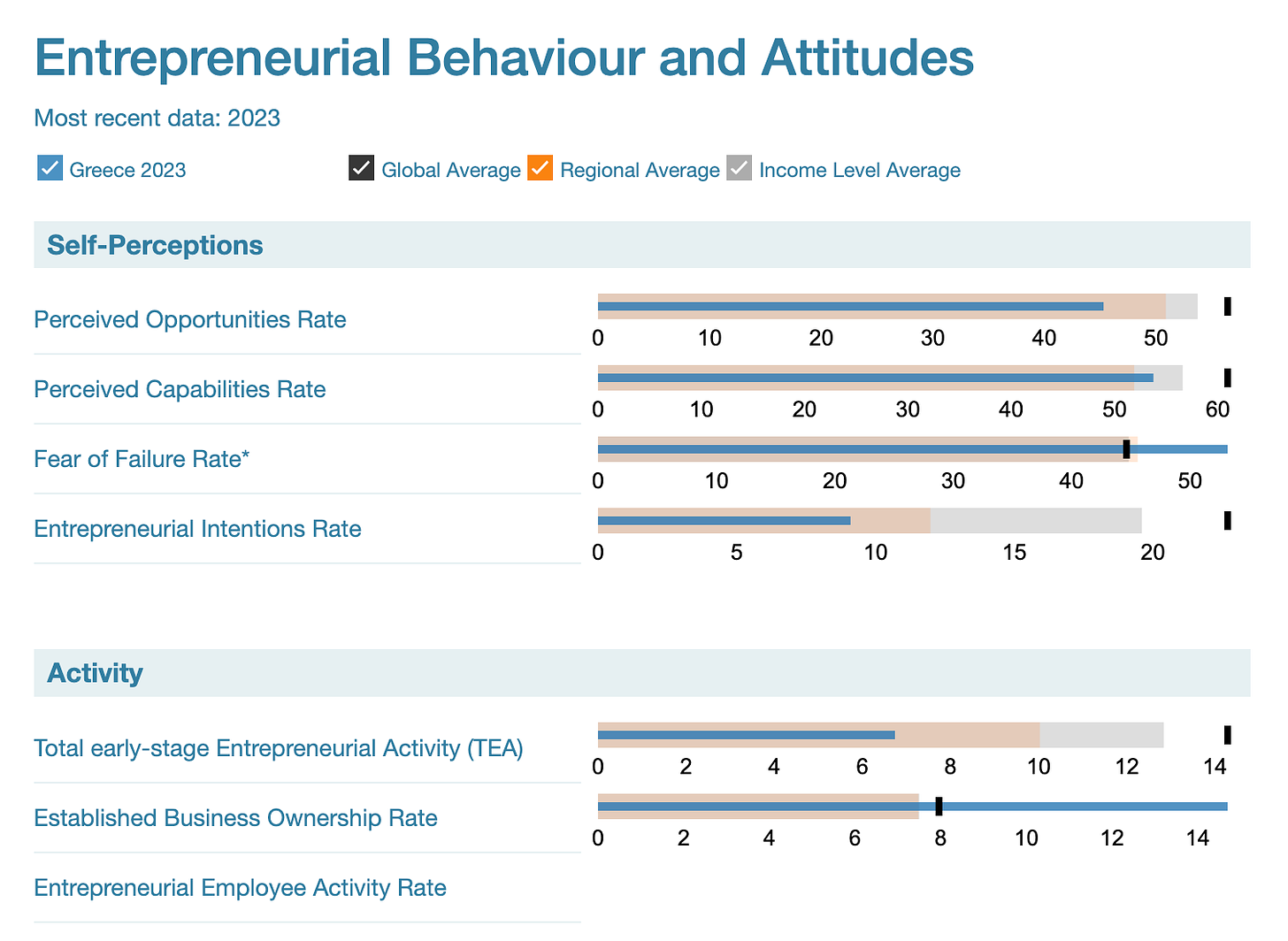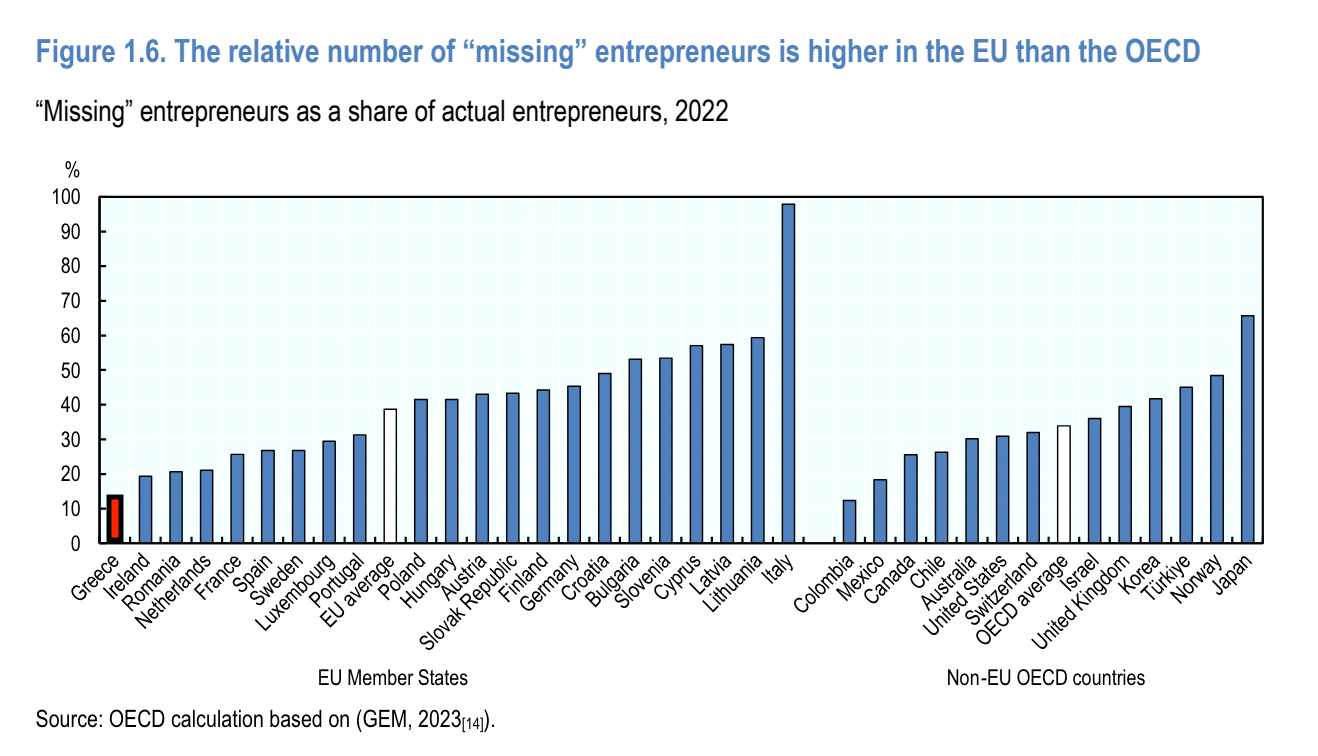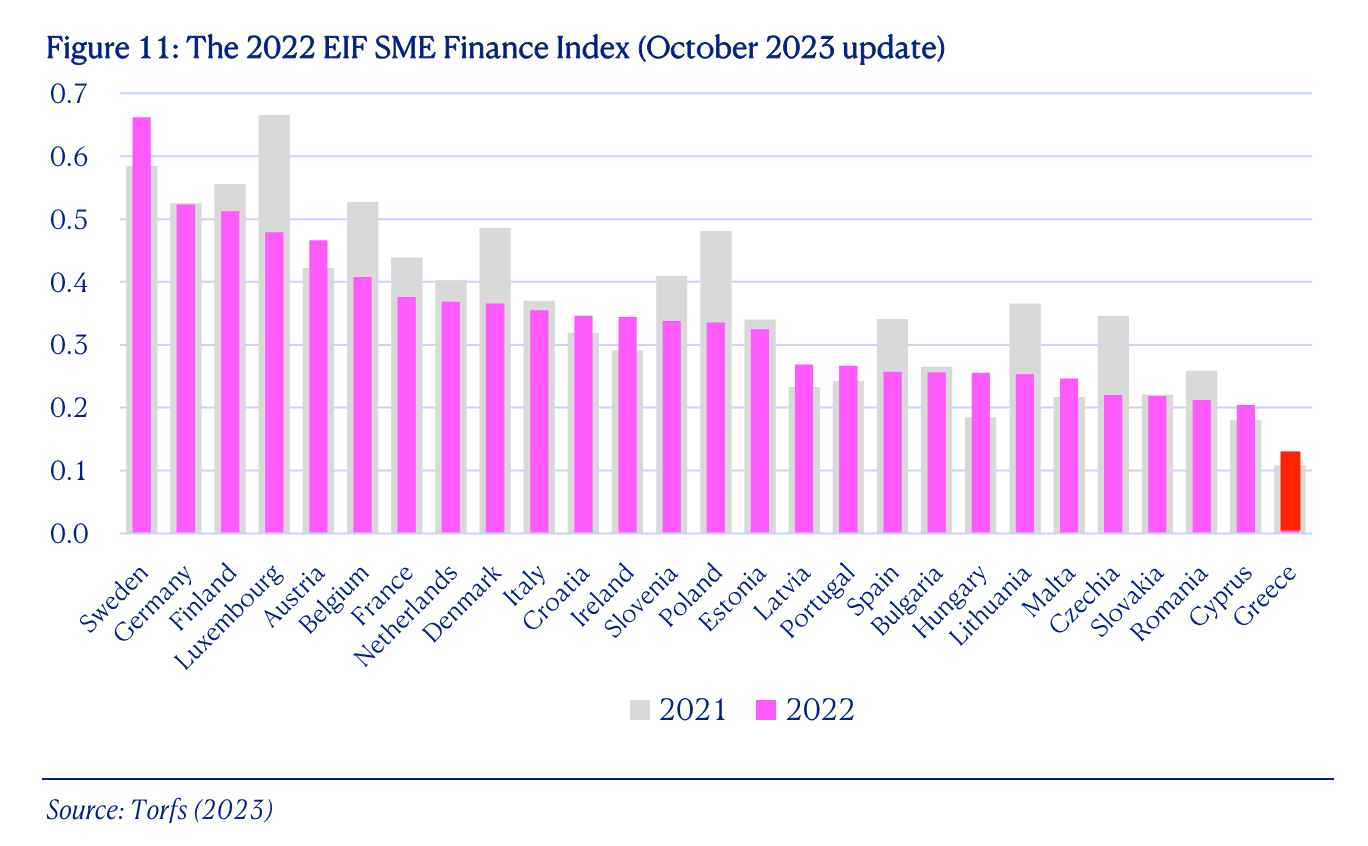Welcome to the 33 awesome new readers who joined in the past week!
If you haven’t subscribed, join 2,435 smart, curious people interested in Changing Greece.
🕴️ Making new Greek Entrepreneurs
A few weeks ago, I was reading the latest Global Entrepreneurship Report by GEM.

Some key findings stood out to me about Greece today:
Not many new entrepreneurs
The percentage of adults in Greece who were already starting or running a new business was a modest 6.7%, fourth lowest in GEM jointly with Lithuania, but an improvement on the 4.9% of the previous year.
Low entrepreneurial profile in public
Entrepreneurship had a fairly low public profile in Greece, with [only] one in three adults knowing someone who had recently started a business (second lowest proportion in GEM behind Thailand), less than one in two adults seeing good opportunities to start a business and few more considering themselves to have the skills and experience to be able to start a business themselves.
Serial entrepreneurship is lacking
In all but one economy (Greece), those who have exited a business in the past year are more likely than the general population to be expecting to start a business, and, in many cases, much more likely.
These are some startling findings at face. Let’s dig a little bit deeper.
Behaviors & Attitudes of Greek entrepreneurs
How do the entrepreneurial behaviors and attitudes of Greeks compare to the rest of the world? Well, in most cases we score below average.

Self-perceptions. According to data from the Global Entrepreneurship Monitor (GEM), Greeks believe they have fewer opportunities available to them. We are also very afraid of failure. This might be a key reason why the intention to start a new company is so much lower in Greece than in most other countries.
Activity. Even though we have many owners and managers of established businesses (primarily SMEs), we have a low proportion of the active population that is actually building new early-stage entrepreneurial ventures today.

How is that possible in a country where business making, maritime trading and retail markets run in its historical DNA and small business ownership is so high?
A few hypotheses:
Economic: The crisis was brutal. It decimated entire business sectors and its pains are too recent to forget. This has raised the perceived risk of starting something new and reduced the ability of people to leave their salaried jobs. High taxes also make exceptionally expensive to start, set up and run new a company — what brilliant mind thought of 50-100% tax downpayment by default each year?
Cultural: Instead of something similar to the “American dream” (i.e. no matter who you are or where you come from, you can make it), we get lost somewhere between “it’s only who you know that matters” and “I hope the neighbor’s goat die.” We do not celebrate winners and love to hate on losers. The Greek society is also too informal. This has led to many small (often, family run) businesses that are not able to scale and fewer successful large companies to emulate.
Political: We do not have the right institutional framework for new businesses that operate in a global world to thrive in. Greece is too bureaucratic and has a very complex legal framework that changes all the time. Entrepreneurs cannot properly plan for the future of their company and always see the state as an unpredictable adversary (unless they feed of it).
The “missing entrepreneurs” of Greece
OECD has a very useful but relatively unknown metric it has started tracking: the number of “missing entrepreneurs” as a share of actual entrepreneurs within a country.
By “missing entrepreneurs”, OECD mean the untapped entrepreneurial potential from under-represented members of society (i.e. women, youth, seniors, the unemployed, immigrants and people with disabilities).
Surprisingly, Greece has the lowest percentage!

This might seem like a paradoxical finding, but if we think of the large number of existing (family owned) SMEs in the country, it should not be as surprising.
Still, there is so much more that we could be doing in Greece. According to OECD:
If everyone was as likely as 30-49 year old men in business creation, there would be an additional 55 000 early-stage entrepreneurs. Of these “missing” entrepreneurs, virtually all would be women.
Clearly, we have a very long way to go when it comes to women entrepreneurship.
We also have an amazing opportunity to expand the pie, if we make it easier for women to enter the marketplace. To that end, it’s very positive to witness some of the recent efforts of the government to enable that transition.
Changing the narrative
We hear a lot about the rise of Greece’s tech scene. There are also other sectors that present fertile grounds for new entrepreneurs, such as manufacturing and agriculture.
Many older Greek companies that have survived the financial crisis are now thriving. There is a special kind of resilience tied to their success — this is why I refer to them as donkey enterprises.
I often go back to this post by Nikos Tsafos (now Chief Energy Adviser to the Greek PM). It talks about stories of entrepreneurs creating successful businesses in Greece at the peak of the crisis about 7 years ago.
We need to listen to these people more often and talk more about their stories.
It’s all about changing the narrative.
Most young Greeks today are contemplating what to do with their future. Do we want to push more of them abroad? Do we want to keep them in Greece trapped between a terrible corporate environment or an all-consuming public sector?
We should enable an alternative path — that of a successful Greek entrepreneur.

Once the richest man in the world, Aristotle Onassis was the most famous Greek entrepreneur of the 21st century.
Onassis might have been a complicated man, but he was a very clear business genius. A risk-taking maverick who inspired an entire generation of Greeks to build a better fortune through global entrepreneurship.
Try to think of even one example of similar caliber since his death 50 years ago.
It’s hard, right?
I believe it’s time to change that.
If you agree, help me spread the word by sharing this article with anyone you think can help Greece make not 1, not 2, but tens of new Onasses over the next 50 years.
It might sound crazy today. But sometimes crazy is all we need to get started.
🏭 Economy & Business
Greek assets — are they a buy? Analysis in BCA Research
Less than 10% of Greeks have an investment account
Tourism expected to drive economy for years to come
Turnover index in retail trade up by 14.3% YoY in May
565 companies submitted plans for R&D subsidies
Greek ports expecting large inflow of investments
Out of Court Workouts (OCWs) keep rising, now at €7.2Bn
Alpha Bank is building its own neobank, after Piraeus
🤖 Tech & Startups
The diaspora is a key part of Greece’s tech rebirth
Research & Innovation has leapfrogged, but still below EU avg
Heron, the new Hellenic Robotics Center, won €30M grant
EREVNA is a new non-profit dedicated to science education
ACX (therapeutics) is out of stealth and joining YC S14
Orfium bets on the potential of Greece as a global tech player
CERTH has a great newsletter on Greek science and tech
🙌 Celebrating Greek wins
Greece has so far 7 medals in the 2024 Olympics: 1x 🥇, 1x 🥈 and 5x🥉
Greek breweries serve more than 100 different brands of beers
Leonidas Kavakos on how practice keeps him in the pantheon of music
Athens Kallithea FC is not just a team, but almost a global fashion brand
📌 Spotlight: Greek SMEs lack financing options
The EIF SME Access to Finance Index is a composite indicator capturing the state of Small and Medium-sized Enterprises (SMEs) external financing.
Even though SMEs constitute 99.9% of all enterprises in Greece, they also suffer from the worst access to financing markets across the EU. They are starving for capital.
This is a huge problem for the Greek economy — but also a great opportunity for new players that might emerge.

That’s it for this week. I hope everyone is having a great summer. I’d love to hear about it too.
Until next time!




Having just returned from holidays in Greece, I must say that we have a unique opportunity as a country to capitalise on the willingness of the diaspora to invest in our country. So many of the tourists I saw/heard while on holidays were Greek (either 1st/2nd generation Greeks or Greeks who left during the GFC). It genuinely blew my mind how many tourists who I initially thought were foreign ended up being Greek. These people obviously come back because they love spending time in Greece. Maybe they can help kickstart local entrepreneurship in Greece if the country becomes a favourable destination for those aspiring to create a business.
If Greece continues to reduce the bureaucracy surrounding business creation, improves the judicial system, and invests in better infrastructure, there will be a fraction of those Greeks who will consider opening up businesses there, or will at least be keen to invest their money in some way (e.g. real estate). I think we have a 15-20 year window to achieve this, otherwise Greece may just end up being solely a holiday destination for a lot of those people, especially the ones who left during the GFC. I'm part of those who left during the GFC and would love to one day invest in the country I've grown up in and love to bits.
I love reading your newsletter and thank you for raising awareness. As a “new” entrepreneur in professional services one of the biggest challenges when setting up and to be sustainable as a business is to remain Global. The Greek market for some professionals is too small or may not present the right type of opportunities for interesting work. My advice is to take the plunge, trust yourself, and always remember that resilience and adaptability is key for any entrepreneur to thrive.